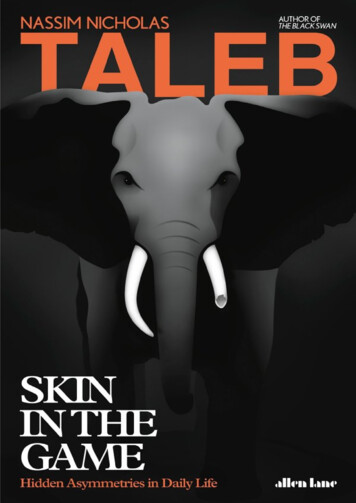
Transcription
Nassim Nicholas TalebSKIN IN THE GAMEHidden Asymmetries in Daily Life
ContentsBOOK 1: INTRODUCTIONThe Less Obvious Aspects of Skin in the GamePrologue, Part 1: Antaeus WhackedLibya After AntaeusLudis de Alieno CorioWarlords Are Still AroundThe Bob Rubin TradeSystems Learn by RemovingPrologue, Part 2: A Brief Tour of SymmetryI. From Hammurabi to KantHammurabi in ParisSilver Beats GoldFuhgedaboud UniversalismII. From Kant to Fat TonyCrook, Fool, or BothCausal Opacity and Preferences RevealedSkin in the Game, but Not All the TimeIII. ModernismHow to Beam Light on a SpeakerSimplicityI Am Dumb Without Skin in the GameRegulations vs. Legal SystemsIV. Soul in the GameArtisansA Caveat with Entrepreneurs
Arrogant Will DoCitizenship de PlaisanceHeroes Were Not Library RatsSoul in the Game and Some (Not Too Much) ProtectionismSkin in the RulingPrologue, Part 3: The Ribs of the IncertoThe RoadAn Enhanced DetectorThe Book ReviewersOrganization of the BookAppendix: Asymmetries in Life and ThingsBOOK 2: A FIRST LOOK AT AGENCYChapter 1. Why Each One Should Eat His Own Turtles: Equality in UncertaintyA Customer Is Born Every DayThe Price of Corn in RhodesEquality in UncertaintyRav Safra and the SwissMembers and Non-MembersNon Mihi non Tibi, sed Nobis (Neither Mine nor Yours, but Ours)Are You on the Diagonal?All (Literally) in the Same BoatTalking One’s BookA Short Visit to the Doctor’s OfficeNextBOOK 3: THAT GREATEST ASYMMETRYChapter 2. The Most Intolerant Wins: The Dominance of the Stubborn MinorityCriminals with Peanut AllergiesRenormalization GroupThe VetoLingua FrancaGenes vs. Languages
The One-Way Street of ReligionsDecentralize, AgainImposing Virtue on OthersStability of the Minority Rule, a Probabilistic ArgumentPopper-Goedel’s ParadoxIrreverence of Markets and ScienceUnus sed Leo: Only One but a LionSummary and NextAppendix to Book 3: A Few More Counterintuitive Things About the CollectiveZero-Intelligence MarketsBOOK 4: WOLVES AMONG DOGSChapter 3. How to Legally Own Another PersonTo Own a PilotFrom the Company Man to the Companies PersonCoase’s Theory of the FirmComplexityA Curious Form of Slave OwnershipFreedom is Never FreeWolves Among the DogsLoss AversionWaiting for ConstantinopleDo Not Rock BureaucristanNextChapter 4. The Skin of Others in Your GameA Mortgage and Two CatsFinding Hidden VulnerabilitiesHow to Put Skin in the Game of Suicide BombersNextBOOK 5: BEING ALIVE MEANS TAKING CERTAIN RISKSChapter 5. Life in the Simulation MachineJesus Was a Risk Taker
Pascal’s WagerThe MatrixThe DonaldNextChapter 6. The Intellectual Yet IdiotWhere to Find a CoconutScience and ScientismIntellectual Yet PhilistineNever Gotten Drunk with RussiansTo ConcludePostscriptChapter 7. Inequality and Skin in the GameInequality vs. InequalityThe Static and the DynamicPikketism and the Revolt of the Mandarin ClassCobbler Envies CobblerInequality, Wealth, and Vertical SocializationEmpathy and HomophilyData, ShmataEthics of Civil ServiceNextChapter 8. An Expert Called LindyWho Is the “Real” Expert?The Lindy of LindyDo We Need a Judge?Tea with the QueenInstitutionsAgainst One’s InterestSoul in the Game, AgainScience is Lindy-ProneEmpirical or Theoretic?
The Grandmother vs. the ResearchersA Brief Tour of Your Grandparents’ WisdomBOOK 6: DEEPER INTO AGENCYChapter 9. Surgeons Should Not Look Like SurgeonsLooking the PartThe Green Lumber FallacyBest-Dressed Business PlanA Bishop for HalloweenThe Gordian KnotOverintellectualization of LifeAnother Business of InterventionGold and RiceThe CompensationEducation as Luxury GoodA BS Detection HeuristicReal Gyms Don’t Look Like GymsNextChapter 10. Only the Rich Are Poisoned: The Preferences of OthersVenenum in Auro BibiturLarge Funeral HomesConversationNonlinearity of ProgressNextChapter 11. Facta non Verba (Deeds Before Words)An Offer Very Hard to RefuseThe AssassinsAssassination as MarketingAssassination as DemocracyThe Camera for Skin in the GameChapter 12. The Facts Are True, the News Is FakeHow to Disagree with Yourself
Information Doesn’t Like to Be OwnedThe Ethics of DisagreementNextChapter 13. The Merchandising of VirtueThe Public and the PrivateThe Virtue MerchantsTo Be or to Seem?SimonyVirtue Is About Others and the CollectiveUnpopular VirtueTake RiskChapter 14. Peace, Neither Ink nor BloodMars vs. SaturnWhere Are the Lions?History Seen from the Emergency RoomNextBOOK 7: RELIGION, BELIEF, AND SKIN IN THE GAMEChapter 15. They Don’t Know What They Are Talking About When They TalkAbout ReligionBelief vs. BeliefLibertarianism and Church-Free ReligionsNextChapter 16. No Worship Without Skin in the GameThe Gods Do Not Like Cheap SignalingThe EvidenceChapter 17. Is the Pope Atheist?Religious in WordsNextBOOK 8: RISK AND RATIONALITYChapter 18. How to Be Rational About RationalityOcular Deception
Ergodicity FirstFrom Simon to GigerenzerRevelation of PreferencesWhat Is Religion About?“Tawk” and Cheap “Tawk”What Does Lindy Say?The Nondecorative in the DecorativeChapter 19. The Logic of Risk TakingErgodicityRepetition of ExposuresWho Is “You”?Courage and Precaution Aren’t OppositesRationality, AgainLove Some RisksNaive EmpiricismSummaryEPILOGUE: WHAT LINDY TOLD MENOTESBIBLIOGRAPHYGLOSSARYTECHNICAL APPENDIXACKNOWLEDGMENTSFOLLOW PENGUIN
BY THE SAME AUTHORINCERTO, an investigation of opacity, luck, uncertainty,probability, human error, risk, and decision making when wedon’t understand the world, expressed in the form of a personalessay with autobiographical sections, stories, parables, andphilosophical, historical, and scientific discussions in nonoverlapping volumes that can be accessed in any order.FOOLED BY RANDOMNESS (2001, 2004), on how wetend to mistake luck for skills, how randomness does not lookrandom, why there is no point talking about performancewhen it is easier to buy and sell than fry an egg, and theprofound difference between dentists and speculators.THE BLACK SWAN (2007, 2010), on how high-impact butrare events dominate history, how we retrospectively giveourselves the illusion of understanding them thanks tonarratives, how they are impossible to estimate scientifically,how this makes some areas—but not others—totallyunpredictable and unforecastable, how confirmatory methodsof knowledge don’t work, and how thanks to Black Swan–blind “faux experts” we are prone to building systemsincreasingly fragile to extreme events.THE BED OF PROCRUSTES (Philosophical Aphorisms)(2010, 2016)ANTIFRAGILE (2012), on how some things like disorder(hence volatility, time, chaos, variability, and stressors) whileothers don’t, how we can classify things along the linesfragile-robust-antifragile, how we can identify (anti)fragilitybased on nonlinear response without having to know muchabout the history of the process (which solves most of theBlack Swan problem), and why you are alive if and only ifyou love (some) volatility.SKIN IN THE GAME (2018), this volume.
INCERTO’S TECHNICAL COMPANION, consisting ofacademic-style papers, miscellaneous notes, and (very)technical remarks and developments.
Two men of courage:Ron Paul,a Roman among Greeks;Ralph Nader,Greco-Phoenician saint
Book 1INTRODUCTION
This book, while standalone, is a continuation of the Incertocollection, which is a combination of a) practical discussions, b)philosophical tales, and c) scientific and analytical commentary onthe problems of randomness, and how to live, eat, sleep, argue,fight, befriend, work, have fun, and make decisions underuncertainty. While accessible to a broad group of readers, don’t befooled: the Incerto is an essay, not a popularization of works doneelsewhere in boring form (leaving aside the Incerto’s technicalcompanion).Skin in the Game is about four topics in one: a) uncertainty andthe reliability of knowledge (both practical and scientific,assuming there is a difference), or in less polite words bull***tdetection, b) symmetry in human affairs, that is, fairness, justice,responsibility, and reciprocity, c) information sharing intransactions, and d) rationality in complex systems and in the realworld. That these four cannot be disentangled is something that isobvious when one has skin in the game.fn1It is not just that skin in the game is necessary for fairness,commercial efficiency, and risk management: skin in the game isnecessary to understand the world.First, it is bull***t identification and filtering, that is, thedifference between theory and practice, cosmetic and trueexpertise, and academia (in the bad sense of the word) and the realworld. To emit a Yogiberrism, in academia there is no differencebetween academia and the real world; in the real world, there is.Second, it is about the distortions of symmetry and reciprocityin life: If you have the rewards, you must also get some of therisks, not let others pay the price of your mistakes. If you inflictrisk on others, and they are harmed, you need to pay some pricefor it. Just as you should treat others in the way you’d like to betreated, you would like to share the responsibility for eventswithout unfairness and inequity.
If you give an opinion, and someone follows it, you are morallyobligated to be, yourself, exposed to its consequences. In case youare giving economic views:Don’t tell me what you “think,” just tell me what’s in your portfolio.Third, the book is about how much information one shouldpractically share with others, what a used car salesman should—orshouldn’t—tell you about the vehicle on which you are about tospend a large segment of your savings.Fourth, it is about rationality and the test of time. Rationality inthe real world isn’t about what makes sense to your New Yorkerjournalist or some psychologist using naive first-order models, butsomething vastly deeper and statistical, linked to your ownsurvival.Do not mistake skin in the game as defined here and used in thisbook for just an incentive problem, just having a share of thebenefits (as it is commonly understood in finance). No. It is aboutsymmetry, more like having a share of the harm, paying a penaltyif something goes wrong. The very same idea ties together notionsof incentives, used car buying, ethics, contract theory, learning(real life vs. academia), Kantian imperative, municipal power, riskscience, contact between intellectuals and reality, theaccountability of bureaucrats, probabilistic social justice, optiontheory, upright behavior, bull***t vendors, theology I stop fornow.THE LESS OBVIOUS ASPECTS OF SKIN IN THE GAMEA more correct (though more awkward) title of the book wouldhave been: The Less Obvious Aspects of Skin in the Game: ThoseHidden Asymmetries and Their Consequences. For I just don’t likereading books that inform me of the obvious. I like to besurprised. So as a skin-in-the-game-style reciprocity, I will not notdrive the reader into a dull college-lecture-type predictablejourney, but rather into the type of adventure I’d like to have.
Accordingly, the book is organized in the following manner. Itdoesn’t take more than about sixty pages for the reader to get theimportance, prevalence, and ubiquity of skin in the game (that is,symmetry) in most of its aspects. But never engage in detailedoverexplanations of why something important is important: onedebases a principle by endlessly justifying it.The nondull route entails focusing on the second step: thesurprising implications—those hidden asymmetries that do notimmediately come to mind—as well as the less obviousconsequences, some of which are quite uncomfortable, and manyunexpectedly helpful. Understanding the workings of skin in thegame allows us to understand serious puzzles underlying the finegrained matrix of reality.For instance:How is it that maximally intolerant minorities run the world andimpose their taste on us? How does universalism destroy the verypeople it means to help? How is it that we have more slaves todaythan we did during Roman times? Why shouldn’t surgeons looklike surgeons? Why did Christian theology keep insisting on ahuman side for Jesus Christ that is necessarily distinct from thedivine? How do historians confuse us by reporting on war, notpeace? How is it that cheap signaling (without anything to risk)fails equally in economic and religious environments? How docandidates for political office with obvious character flaws seemmore real than bureaucrats with impeccable credentials? Why dowe worship Hannibal? How do companies go bust the minute theyhave professional managers interested in doing good? How ispaganism more symmetrical across populations? How shouldforeign affairs be conducted? Why should you never give moneyto organized charities unless they operate in a highly distributivemanner (what is called Uberized in modern lingo)? Why do genesand languages spread differently? Why does the scale ofcommunities matter (a community of fishermen turns fromcollaborative to adversarial once one moves the scale, that is the
number of people involved, a notch)? Why does behavioraleconomics have nothing to do with the study of the behavior ofindividuals—and markets have little to do with the biases ofparticipants? How is rationality survival and survival only? Whatis the foundational logic of risk bearing?But, to this author, skin in the game is mostly about justice,honor, and sacrifice, things that are existential for humans.Skin in the game, applied as a rule, reduces the effects of thefollowing divergences that grew with civilization: those betweenaction and cheap talk (tawk), consequence and intention, practiceand theory, honor and reputation, expertise and charlatanism,concrete and abstract, ethical and legal, genuine and cosmetic,merchant and bureaucrat, entrepreneur and chief executive,strength and display, love and gold-digging, Coventry andBrussels, Omaha and Washington, D.C., human beings andeconomists, authors and editors, scholarship and academia,democracy and governance, science and scientism, politics andpoliticians, love and money, the spirit and the letter, Cato theElder and Barack Obama, quality and advertising, commitmentand signaling, and, centrally, collective and individual.Let us first connect a few dots of the items in the list above withtwo vignettes, just to give the flavor of how the idea transcendscategories.
Prologue, Part 1Antaeus WhackedNever run away from Mamma—I keep finding warlords—Bob Rubin and histrade—Systems like car accidentsAntaeus was a giant, or rather a semi-giant of sorts, the literal sonof Mother Earth, Gaea, and Poseidon, the god of the sea. He had astrange occupation, which consisted of forcing passersby in hiscountry, (Greek) Libya, to wrestle; his thing was to pin his victimsto the ground and crush them. This macabre hobby was apparentlythe expression of filial devotion; Antaeus aimed at building atemple to his father, Poseidon, using for raw material the skulls ofhis victims.Antaeus was deemed to be invincible, but there was a trick. Hederived his strength from contact with his mother, Earth.Physically separated from contact with Earth, he lost all hispowers. Hercules, as part of his twelve labors (in one variation ofthe tale), had for homework to whack Antaeus. He managed to lifthim off the ground and terminated him by crushing him as his feetremained out of contact with his mamma.We retain from this first vignette that, just like Antaeus, youcannot separate knowledge from contact with the ground.Actually, you cannot separate anything from contact with theground. And the contact with the real world is done via skin in thegame—having an exposure to the real world, and paying a pricefor its consequences, good or bad. The abrasions of your skinguide your learning and discovery, a mechanism of organicsignaling, what the Greeks called pathemata mathemata (“guide
your learning through pain,” something mothers of young childrenknow rather well). I have shown in Antifragile that most thingsthat we believe were “invented” by universities were actuallydiscovered by tinkering and later legitimized by some type offormalization. The knowledge we get by tinkering, via trial anderror, experience, and the workings of time, in other words,contact with the earth, is vastly superior to that obtained throughreasoning, something self-serving institutions have been very busyhiding from us.Next, we will apply this to what is miscalled “policy making.”LIBYA AFTER ANTAEUSSecond vignette. As I am writing these lines, a few thousand yearslater, Libya, the putative land of Antaeus, now has slave markets,as a result of a failed attempt at what is called “regime change” inorder to “remove a dictator.” Yes, in 2017, improvised slavemarkets in parking lots, where captured sub-Saharan Africans aresold to the highest bidders.A collection of people classified as interventionistas (to namenames of people operating at the time of writing: Bill Kristol,Thomas Friedman, and others ) who promoted the Iraq invasionof 2003, as well as the removal of the Libyan leader in 2011, areadvocating the imposition of additional such regime change onanother batch of countries, which includes Syria, because it has a“dictator.”fn1These interventionistas and their friends in the U.S. StateDepartment helped create, train, and support Islamist rebels, then“moderates,” but who eventually evolved to become part of alQaeda, the same, very same al-Qaeda that blew up the New YorkCity towers during the events of September 11, 2001. Theymysteriously failed to remember that al-Qaeda itself wascomposed of “moderate rebels” created (or reared) by the U.S. tohelp fight Soviet Russia because, as we will see, these educatedpeople’s reasoning doesn’t entail such recursions.
So we tried that thing called regime change in Iraq, and failedmiserably. We tried that thing again in Libya, and there are nowactive slave markets in the place. But we satisfied the objective of“removing a dictator.” By the exact same reasoning, a doctorwould inject a patient with “moderate” cancer cells to improve hischolesterol numbers, and proudly claim victory after the patient isdead, particularly if the postmortem shows remarkable cholesterolreadings. But we know that doctors don’t inflict fatal “cures” uponpatients, or don’t do it in such a crude way, and there is a clearreason for that. Doctors usually have some modicum of skin in thegame, a vague understanding of complex systems, and more thana couple of millennia of incremental ethics determining theirconduct.And don’t give up on logic, intellect, and education, becausetight but higher order logical reasoning would show that, unlessone finds some way to reject all empirical evidence, advocatingregime changes implies also advocating slavery or some similardegradation of the country (since these have been typicaloutcomes). So these interventionistas not only lack practical sense,and never learn from history, but they even fail at pure reasoning,which they drown in elaborate semiabstract buzzword-ladendiscourse.Their three flaws: 1) they think in statics not dynamics, 2) theythink in low, not high, dimensions, 3) they think in terms ofactions, never interactions. We will see in more depth throughoutthe book this defect of mental reasoning by educated (or, rather,semi-educated) fools. I can flesh out the three defects for now.The first flaw is that they are incapable of thinking in secondsteps and unaware of the need for them—and about every peasantin Mongolia, every waiter in Madrid, and every car-serviceoperator in San Francisco knows that real life happens to havesecond, third, fourth, nth steps. The second flaw is that they arealso incapable of distinguishing between multidimensionalproblems and their single-dimensional representations—like
multidimensional health and its stripped, cholesterol-readingreduction. They can’t get the idea that, empirically, complexsystems do not have obvious one-dimensional cause-and-effectmechanisms, and that under opacity, you do not mess with such asystem. An extension of this defect: they compare the actions ofthe “dictator” to those of the prime minister of Norway orSweden, not to those of the local alternative. The third flaw is thatthey can’t forecast the evolution of those one helps by attacking,or the magnification one gets from feedback.LUDIS DE ALIENO CORIO fn2And when a blowup happens, they invoke uncertainty, somethingcalled a Black Swan (a high-impact unexpected event), after abook by a (very) stubborn fellow, not realizing that one should notmess with a system if the results are fraught with uncertainty, or,more generally, should avoid engaging in an action with a bigdownside if one has no idea of the outcomes. What is crucial hereis that the downside doesn’t affect the interventionist. Hecontinues his practice from the comfort of his thermally regulatedsuburban house with a two-car garage, a dog, and a small playarea with pesticide-free grass for his overprotected 2.2 children.Imagine people with similar mental handicaps, people whodon’t understand asymmetry, piloting planes. Incompetent pilots,those who cannot learn from experience, or don’t mind takingrisks they don’t understand, may kill many. But they willthemselves end up at the bottom of, say, the Bermuda Triangle,and cease to represent a threat to others and mankind. Not here.So we end up populating what we call the intelligentsia withpeople who are delusional, literally mentally deranged, simplybecause they never have to pay for the consequences of theiractions, repeating modernist slogans stripped of all depth (forinstance, they keep using the term “democracy” whileencouraging headcutters; democracy is something they read aboutin graduate studies). In general, when you hear someone invoking
abstract modernistic notions, you can assume that they got someeducation (but not enough, or in the wrong discipline) and havetoo little accountability.Now some innocent people—Ezidis, Christian minorities in theNear (and Middle) East, Mandeans, Syrians, Iraqis, and Libyans—had to pay a price for the mistakes of these interventionistascurrently sitting in comfortable air-conditioned offices. This, wewill see, violates the very notion of justice from its prebiblical,Babylonian inception—as well as the ethical structure, thatunderlying matrix thanks to which humanity has survived.The principle of intervention, like that of healers, is first do noharm (primum non nocere); even more, we will argue, those whodon’t take risks should never be involved in making decisions.Further,We have always been crazy but weren’t skilled enough to destroy the world.Now we can.We will return to the “peacemaking” interventionistas, andexamine how their peace processes create deadlocks, as with theIsraeli-Palestinian problem.WARLORDS ARE STILL AROUNDThis idea of skin in the game is woven into history: historically,all warlords and warmongers were warriors themselves, and, witha few curious exceptions, societies were run by risk takers, notrisk transferors.Prominent people took risks—considerably more risks thanordinary citizens. The Roman emperor Julian the Apostate, aboutwhom much later, died on the battlefield fighting in the neverending war on the Persian frontier—while emperor. One may onlyspeculate about Julius Caesar, Alexander, and Napoleon, owing tothe usual legend-building by historians, but here the proof is stark.There is no better historical evidence of an emperor taking afrontline position in battle than a Persian spear lodged in his chest
(Julian omitted to wear protective armor). One of his predecessors,Valerian, was captured on the same frontier, and was said to havebeen used as a human footstool by the Persian Shapur whenmounting his horse. And the last Byzantine emperor, ConstantineXI Palaeologus, was last seen when he removed his purple toga,then joined Ioannis Dalmatus and his cousin TheophilusPalaeologus to charge Turkish troops with their swords abovetheir heads, proudly facing certain death. Yet legend has it thatConstantine had been offered a deal in the event of a surrender.Such deals are not for self-respecting kings.These are not isolated anecdotes. The statistical reasoner in thisauthor is quite convinced: less than a third of Roman emperorsdied in their beds—and one can argue that given that only few ofthese died of really old age, had they lived longer, they wouldhave fallen either to a coup or in battle.Even today, monarchs derive their legitimacy from a socialcontract that requires physical risk-taking. The British Royalfamily made sure that one of its scions, Prince Andrew, took morerisks than “commoners” during the Falkland war of 1982, hishelicopter being in the front line. Why? Because noblesse oblige;the very status of a lord has been traditionally derived fromprotecting others, trading personal risk for prominence—and theyhappened to still remember that contract. You can’t be a lord ifyou aren’t a lord.THE BOB RUBIN TRADESome think that freeing ourselves from having warriors at the topmeans civilization and progress. It does not. Meanwhile,Bureaucracy is a construction by which a person is conveniently separatedfrom the consequences of his or her actions.And, one may ask, what can we do since a centralized systemwill necessarily need people who are not directly exposed to thecost of errors?
Well, we have no choice but to decentralize or, more politely, tolocalize; to have fewer of these immune decision makers.Decentralization is based on the simple notion that it is easier tomacrobull***t than microbull***t.Decentralization reduces large structural asymmetries.But not to worry, if we do not decentralize and distributeresponsibility, it will happen by itself, the hard way: a system thatdoesn’t have a mechanism of skin in the game, with a buildup ofimbalances, will eventually blow up and self-repair that way. If itsurvives.For instance, bank blowups came in 2008 because of theaccumulation of hidden and asymmetric risks in the system:bankers, master risk transferors, could make steady money from acertain class of concealed explosive risks, use academic riskmodels that don’t work except on paper (because academics knowpractically nothing about risk), then invoke uncertainty after ablowup (that same unseen and unforecastable Black Swan and thatsame very, very stubborn author), and keep past income—what Ihave called the Bob Rubin trade.The Bob Rubin trade? Robert Rubin, a former Secretary of theUnited States Treasury, one of those who sign their names on thebanknote you just used to pay for coffee, collected more than 120million in compensation from Citibank in the decade precedingthe banking crash of 2008. When the bank, literally insolvent, wasrescued by the taxpayer, he didn’t write any check—he invokeduncertainty as an excuse. Heads he wins, tails he shouts “BlackSwan.” Nor did Rubin acknowledge that he transferred risk totaxpayers: Spanish grammar specialists, assistant schoolteachers,supervisors in tin can factories, vegetarian nutrition advisors, andclerks for assistant district attorneys were “stopping him out,” thatis, taking his risks and paying for his losses. But the worstcasualty has been free markets, as the public, already prone tohating financiers, started conflating free markets and higher orderforms of corruption and cronyism, when in fact it is the exact
opposite: it is government, not markets, that makes these thingspossible by the mechanisms of bailouts. It is not just bailouts:government interference in general tends to remove skin in thegame.The good news is that in spite of the efforts of a complicitObama administration that wanted to protect the game and therent-seeking bankers, the risk-taking business started movingtoward small independent structures known as hedge funds. Themove took place mostly because of the overbureaucratization ofthe system as paper shufflers (who think work is mostly aboutpaper shuffling) overburdened the banks with rules—butsomehow, in the thousands of pages of additional regulations, theyavoided considering skin in the game. In the decentralized hedgefund space, on the other hand, owner-operators have at least halfof their net worth in the funds, making them relatively moreexposed than any of their customers, and they personally go downwith the ship.fn3SYSTEMS LEARN BY REMOVINGNow, if you are going to highlight only one single section fromthis book, here is the one. The interventionista case is central toour story because it shows how absence of skin in the game hasboth ethical and epistemological effects (i.e., related toknowledge). We saw that interventionistas don’t learn becausethey are not the victims of their mistakes, and, as we hinted at withpathemata mathemata:The same mechanism of transferring risk also impedes learning.More practically,You will never fully convince someone that he is wrong; only reality can.Actually, to be precise, reality doesn’t care about winningarguments: survival is what matters.For
The curse of modernity is that we are increasingly populated by a class ofpeople who are better at explaining than understanding,or better at explaining than doing.So learning isn’t quite what we teach inmates inside the highsecurity prisons called schools. In biology, learning is somethingthat, through the filter of intergenerational selection, getsimprinted at the cellular level—skin in the game, I insist, is morefilter than deterrence. Evolution can only happen if risk ofextinction is present. Further,There is no evolution without skin in the game.This last point is quite obvious, but I keep seeing academicswith no skin in the game defend evolution while at the same timerejecting skin in the game and risk sharing. They refuse the notionof design by a creator who knows everything, while, at the sametime, want to impose human design as if they knew all theconsequences. In general, the more people worship the sacrosanctstate (or, equivalently, large corporations), the more they hate skinin the game. The more they believe in their
Sep 11, 2001 · This book, while standalone, is a continuation of the Incerto collection, which is a combination of a) practical discussions, b) philosophical tales, and c) scientific and analytical commentary on the problems of randomness, and how to live, eat, sleep, argue, fight, befrie










